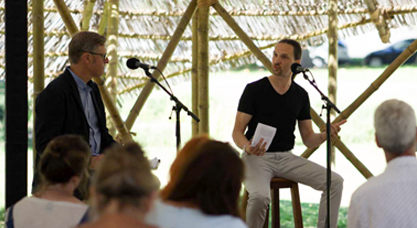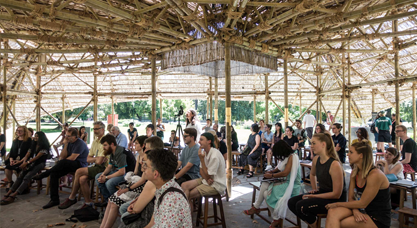It was a beautiful Melbourne Saturday summer morning and ducks waddled past on their way to a nearby pond as we took our seats for a relay of ideas.
Instead of passing the baton, we passed the microphone, being interviewed and then interviewing another participant. It was a very spontaneous process and the conversations were fascinating. I was especially taken with the work of Jefa Greenaway, one of only 12 Indigenous architects in Australia and his explanation of incorporating the seven local Indigenous seasons into the design of a public garden at RMIT.
Kate Dundas (pictured above-right), an award winning landscape architect, urban planner, and a founder of 3000 Acres, asked me a question that got me thinking over the weekend: "What do you say to people who have an idea that could make a huge difference to a problem (like food insecurity) but just can't get their idea over the line into testing and implementation?”. My answer was: "Just keep going!"
This might seem like a glib answer but it wasn't meant to be. Many good ideas about social or environmental problems are ahead of their time or bring such fresh thinking to a challenge that a business or government investor is not keen or able to come on board. Maybe there is an unclear path to profit? Maybe it is too risky?

Jefa Greenaway, one of only 12 Indigenous architects in Australia, participating in MRelay. This is where philanthropic investment can come in. A foundation can make a grant or impact investment to an eligible organisation so that a social change champion or a team of champions can test their idea, develop a business plan, bring in other collaborators and funders, move from planning to start up, and finally begin to implement.
Social change is often difficult. It usually takes a lot of perseverance and courage to move a possible solution to a tough issue from idea to reality.
I remember the first time I visited the MS Society's nursing home as the in-house lawyer many years ago. I was profoundly shocked by the young age of many people living in the nursing home – simply because there was nowhere else for people to go where a high level of care could be provided. I spent the next five years continually seeking government funding for attendant care services to enable people to stay living in their homes for as long as possible.
I would return from some of these meetings quite deflated as the funding program's didn't exist yet. My CEO, John Foley, would tell me: “Don’t give up. We will find another way.” And we eventually did. People with disabilities organising their own care is common now.
This experience at the MS Society was one reason I was so keen for the Foundation to invest in HireUp as an impact investment. HireUp is an online platform that enables people with disabilities to find a carer of their choice, of a similar age with similar interests, perhaps with a shared cultural background.
To get a possible solution from an idea to reality needs research, planning, testing and often redesigning. Knowing this, we have tried to ensure that the Foundation’s grants program supports these different elements in different ways.

MPavilion, designed by leading Indian architect Bijoy Jain, is home to a dynamic program of free events presented over four months that celebrate design, architecture, collaboration, and art in public spaces. Two grants that helped research tough issues and have set the groundwork for further work are FoodPrint Melbourne and Time of Our Lives?.
FoodPrint, by Dr Rachel Carey at the Victorian Eco Innovation Lab has studied Melbourne's food bowl and has given us a clear vision for what we need to protect and develop to support a sustainable food system.
Time of Our Lives?, by Professor Susan Feldman and Dr Harriet Radermacher at Monash University, explains the main factors that can occur over a woman's life which can lead to income poverty in old age. Having evidence and clear understanding of the causes of the problem means one or more solutions can be tested with a degree of confidence. There is always risk around a new service or product, but it is now an informed risk.
By chance, a philanthropy friend of mine sent me an email today with his daily piece of advice. Today’s said, “challenge is tough, yet you are tougher. Keep going, and get through it.”
So do your research to understand the challenge you want to solve, plan well, test and test again. Above all, just keep going until your idea is a reality or you are sure that, actually, it isn’t such a great idea after all. Then start the creative problem solving process again.
Catherine Brown
Chief Executive Officer
@CatherineB_AU